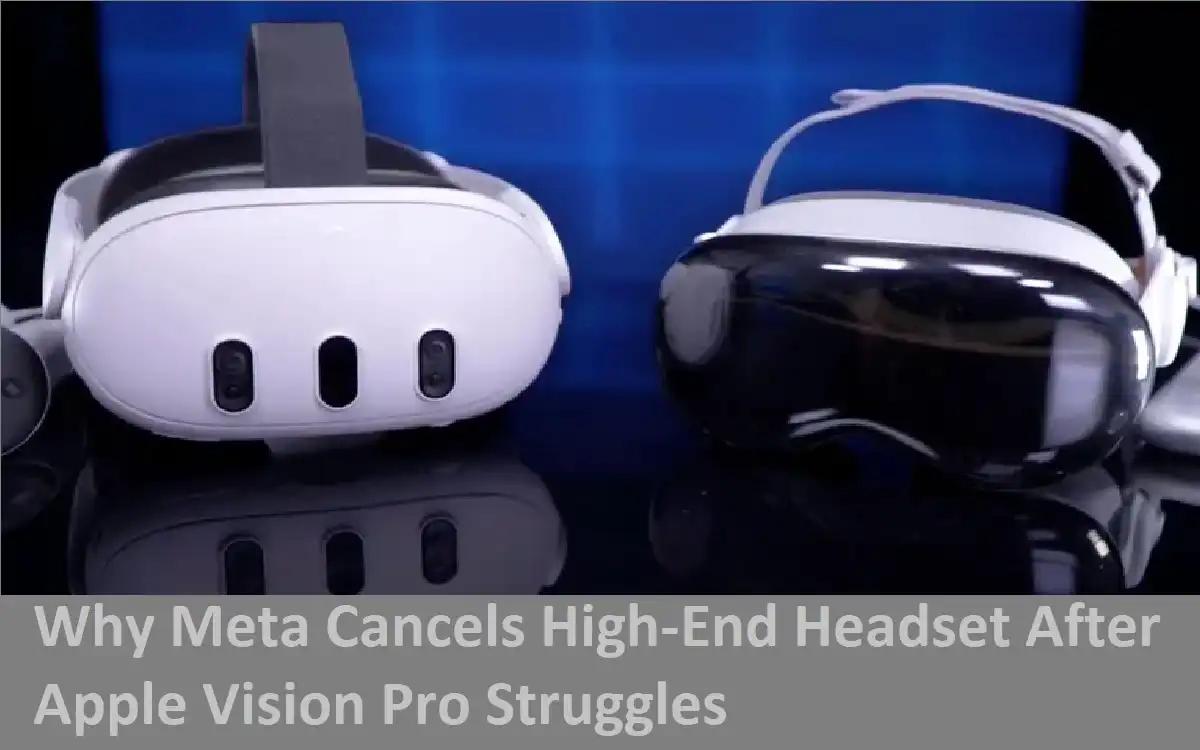Introduction
Recently, Meta (formerly Facebook) made a significant strategic decision that has sent ripples through the industry. This article discover Meta’s cancellation of its high-end mixed reality headset project, codenamed La Jolla, and explores the implications of this move in the context of Apple’s Vision Pro struggles.
Recent Released: How To Use Apple Translation Framework on iOS 17.4 and Later
The La Jolla Project: Meta’s Abandoned Vision
Project Overview
Meta’s La Jolla project was an ambitious endeavor aimed at creating a premium mixed-reality headset to rival Apple’s Vision Pro. Slated for a 2027 launch, the device was intended to showcase cutting-edge technology and establish Meta as a leader in high-end mixed reality experiences.
Technical Specifications
The La Jolla headset was designed to incorporate:
- High-resolution micro OLED displays
- Advanced mixed reality capabilities
- Competitive features to match or exceed the Apple Vision Pro
Target Market Meta aimed to position La Jolla as a premium offering for:
- Tech enthusiasts
- Professional users
- Content creators
- Early adopters of mixed reality technology
The Apple Vision Pro: A Cautionary Tale
Initial Hype and Expectations
When Apple announced the Vision Pro, it generated significant buzz in the tech community. Many expected it to revolutionize the mixed reality market, given Apple’s track record of successful product launches.
Market Performance
Despite initial enthusiasm, the Vision Pro has faced several challenges:
- Weak sales performance
- Waning consumer interest over time
- Projected sales of less than 500,000 units in 2024
Factors Contributing to Struggles
Several factors have contributed to the Vision Pro’s difficulties:
- High price point
- Limited content ecosystem
- Niche appeal
- Competition from more affordable alternatives
Meta’s Decision to Cancel La Jolla
Key Factors Influence
the Decision Meta’s choice to abandon the La Jolla project was influenced by several factors:
a) Vision Pro’s Market Performance: The lackluster reception of Apple’s high-end headset raised concerns about the viability of premium mixed reality devices in the current market.
b) Cost Considerations: High-resolution micro OLED displays, similar to those used in the Vision Pro, proved to be prohibitively expensive. This made it challenging for Meta to achieve its target price point of under $1,000 while maintaining profitability.
c) Strategic Review: A product review meeting attended by key Meta executives, including CEO Mark Zuckerberg and CTO Andrew Bosworth, led to the decision to cancel the project.
Shift in Focus Meta’s cancellation of La Jolla signifies a strategic pivot towards:
- Lower-cost VR/AR models
- Software development
- Expanding the ecosystem for mixed reality experiences
Meta’s New Direction in Mixed Reality
Affordable Hardware
Development Meta is redirecting its efforts towards more accessible VR/AR devices:
- Continued development of the Quest 4, successor to the Quest 3
- Target price point of around $500 for the Quest 4
- Focus on improving existing product lines rather than creating new premium offerings
Software and Platform
Development Meta is placing increased emphasis on software solutions:
- Introduction of the Horizon OS platform for third-party hardware makers
- Development of a robust content ecosystem
- Encouraging wider adoption of VR/AR technology through software initiatives
Ecosystem Expansion
By focusing on more affordable hardware and open software platforms, Meta aims to:
- Increase the user base for mixed reality experiences
- Encourage third-party development and innovation
- Create a more diverse and competitive market for VR/AR devices
Implications for the VR/AR Industry
Market Dynamics
Meta’s decision and Apple’s struggles highlight several industry trends:
- Shift towards more affordable VR/AR solutions
- Emphasis on software and content over hardware specifications
- Reevaluation of premium pricing strategies in the mixed reality market
Competition and Innovation
The cancellation of La Jolla may impact the competitive landscape:
- Reduced pressure on high-end manufacturers
- Increased focus on mid-range and entry-level devices
- Potential for new players to enter the market with innovative, cost-effective solutions
Consumer Expectations
These developments may shape consumer perceptions and expectations:
- Greater demand for value-oriented VR/AR experiences
- Increased focus on practical applications and content availability
- Shift away from purely high-end, premium experiences
Table: Comparison of VR/AR Market Strategies
| Company | High-End Strategy | Mid-Range Strategy | Software Focus | Key Products |
| Meta | Canceled (La Jolla) | Quest 4 (upcoming) | Horizon OS | Quest 3, Ray-Ban Stories |
| Apple | Vision Pro (struggling) | N/A | visionOS | Vision Pro |
| Sony | PlayStation VR2 | N/A | PlayStation VR games | PlayStation VR2 |
| HTC | Vive Pro 2 | Vive Cosmos | Viveport | Various Vive models |
| Microsoft | HoloLens 2 (enterprise) | N/A | Windows Mixed Reality | HoloLens 2 |
Conclusion
Meta’s decision to cancel its high-end mixed reality headset project, La Jolla, marks a significant shift in the company’s strategy and reflects broader trends in the VR/AR industry. As Apple’s Vision Pro struggles to gain traction, Meta’s pivot towards more affordable hardware and robust software development highlights the challenges and opportunities in the evolving mixed reality landscape.
This strategic realignment underscores the importance of balancing innovation with market realities and consumer demand. As the industry continues to mature, we can expect to see further adjustments from major players as they seek to find the right balance between technological advancement, affordability, and user adoption.
The coming years will likely see increased focus on creating compelling content, improving user experiences, and developing practical applications for mixed reality technology. As the market evolves, the success of VR/AR initiatives will depend not only on hardware specifications but also on the ability to create engaging, valuable experiences that resonate with a broader audience.
Meta’s new direction, emphasizing affordability and software development, may well set the tone for the next phase of growth in the mixed reality industry. As companies continue to innovate and adapt, the ultimate winners in this space will be those who can effectively bridge the gap between cutting-edge technology and mainstream consumer adoption.


